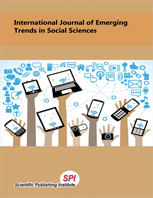The Relationship Between Small Business Employee’s Work Performance and Workplace Spirituality
DOI:
https://doi.org/10.20448/2001.91.29.34Keywords:
Workplace spirituality, Employee performance, Customer service, Small business performance.Abstract
The paper examines the relationship between small business employee’s performance and workplace spirituality. Specifically, the paper investigated whether any relationship existed between the two variables. To that effect, a survey of randomly selected 160 focus group consisting of business owners and employees of ages 25-50 in the state of North Carolina was conducted to gather data on how workplace spirituality affects business employee’s performance. SPSS software, regressions, and analysis of variance (ANOVA) were utilized to conduct statistical analyses of the collected data. The Pearson correlation’s result shows the existence of a strong positive relationship between employee’s work performance and workplace spirituality. The ANOVA results also show strong relationship between employee’s work performance and workplace spirituality as culture in a business organization’s environment. In conclusion, small business employee’s work performance and workplace spirituality have strong positive relationship. Also, workplace spirituality positively affects small business employee’s performance. This strong positive effect will in turn boost small business organization’s overall performance. The boost will occur through the positive effect of workplace spirituality on the employee’s work performance.


